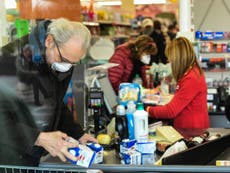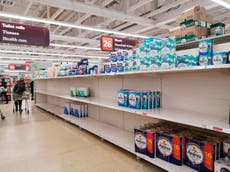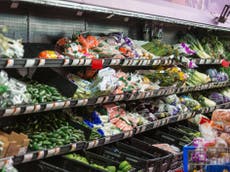When the government’s coronavirus guidance is this contradictory, you can’t blame people for panic-buying
If you want people to behave better, it takes someone setting an example, and that example needs to come from the top...Oh dear

“What’s happening to us?”
That’s what one of my friends asked having posted a picture of supermarket shelves denuded of loo roll on Facebook.
And it isn’t just the Andrex that’s getting hard to source.
“We have soap,” my delighted partner declared, having returned from a Sunday shopping trip. But there was no hand sanitizer and the only paracetamol available was the ruinously expensive brand name stuff which she (sensibly) passed on.
Supermarkets have also reported runs on cupboard basics such as tinned food and pasta.
“Panic-buying” is all the rage, although it’s a very civilised sort of “panic”. The preppers are hardly clawing each others’ eyes out in the supermarket aisles. They seem perfectly prepared to wait for an Ocado slot to open up (and wait is what they’re having to do) to get their stocks in.
While this may be unnecessary, and infuriating to people who get caught short when it comes to certain non-essential but still rather important products, such actions are far from irrational if you consider the backdrop.
We’ve had warnings about a fifth of the workforce going off sick; export restrictions placed on certain drugs by India; this morning’s report of a shortage of surgical masks because China, at the Covid-19 epicentre, is understandably reluctant to let them go; warnings about the impact of all this on the global supply chain.
I didn’t find any sensationalism when I read these stories in the media. Just fact-based reporting from which certain parts of the public are joining their own dots.
The government has been trying to reassure, but it’s finding it tough to do that and this is thanks to its history of mendacity.
The best of it is, the government is still playing games, and at the worst possible time. The dismal performance of Matt Hancock, the health secretary, on Question Time last Thursday is a case in point.
He said that the government was in talks with supermarkets about home deliveries and the like, only for it subsequently to emerge that no such discussions had taken place, although the phone lines were running hot the next day.
“While I think people don’t need to panic-buy and should just shop normally, I’m not sure the government can guarantee all food supply in all instances,” said one supermarket source.
You can see the problem with that statement, can’t you? The second part appears, while carefully qualified, to rather contradict the first. It’s the sort of thing people read and say to themselves “why risk it?”
Given that any extra stuff they might be tempted to stockpile will likely be non-perishable and available for their use when the crisis has passed, well, why indeed?
There’s really nothing to lose, meanwhile, ministers seem incapable of rising to the simple challenge of not lying through their teeth and/or stomping on people who raise legitimate concerns. This is something that extends down the pubic sector food chain.
The Independent’s report about the masks told a familiar tale of gags being used to prevent NHS staff from telling the truth about them.
Combine that with ministers’ history of incompetence, would you put your trust in the government’s ability to set aside short-term political considerations in favour of rising to a challenge like this one?
At this point, you’re probably thinking this is a remarkably hard, even cynical, column, completely at odds with the one I wrote opining that people were far more frightening than the coronavirus (which remains true).
Recall that your chance of succumbing to the virus if you’re otherwise healthy is very small, while there were 27,820 people killed or seriously injured in road traffic accidents just in the year to the end of June 2019.
Writing in the New York Times, Richard Friedman, a professor of clinical psychiatry, used statistics like that one, but from the US, as part of an argument that the best response to the virus is not panic-buying, or even sensible stockpiling, but altruism: looking out for one another.
Trouble is, people aren’t going to do that when they’re led by people for whom that’s an alien concept and who give the impression that looking after themselves and their political careers is all that counts.
If you want people to behave better, it takes someone setting an example, and that example needs to come from the top. Oh dear.
Hancock and his colleagues are failing miserably on that front.
Now, forgive me, an Ocado slot just opened up.






Join our commenting forum
Join thought-provoking conversations, follow other Independent readers and see their replies